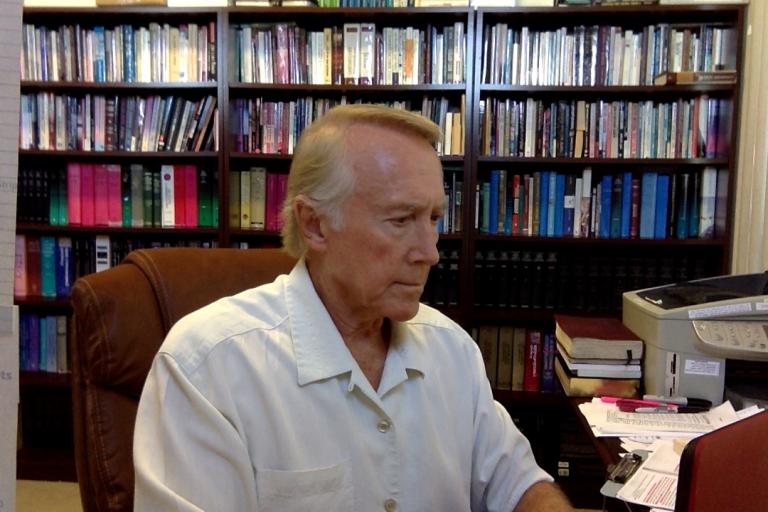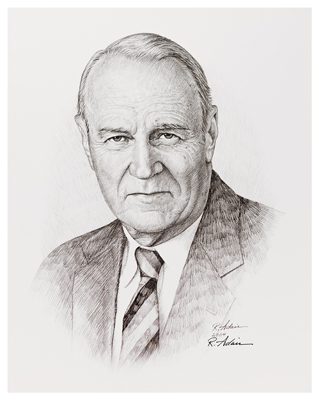My First Christological Discussion with Dr. S. Lewis Johnson—Section C
 Dr. S. Lewis Johnson and I then discussed the Arian Controversy and the Nicene Council of 325. Church historian Eusebius had been a prominent figure at the council. He took a middle position between the teaching of Presbyter Arius and that of Bishop Alexander, thus being dubbed a “semi-Arian.” Athanasius, the bishop’s assistant, afterwards became the determined defender of the Nicene Creed for decades. Lewis said Athanasius was right about it, and Eusebius was “prejudiced.” He then added, “Eusebius did not accept the Johannine authorship of the Apocalypse” (the book of Revelation). I thought this strange and irrelevant to the discussion. I later learned it was an ad hominem argument. Lewis was grasping for straws against Eusebius.
Dr. S. Lewis Johnson and I then discussed the Arian Controversy and the Nicene Council of 325. Church historian Eusebius had been a prominent figure at the council. He took a middle position between the teaching of Presbyter Arius and that of Bishop Alexander, thus being dubbed a “semi-Arian.” Athanasius, the bishop’s assistant, afterwards became the determined defender of the Nicene Creed for decades. Lewis said Athanasius was right about it, and Eusebius was “prejudiced.” He then added, “Eusebius did not accept the Johannine authorship of the Apocalypse” (the book of Revelation). I thought this strange and irrelevant to the discussion. I later learned it was an ad hominem argument. Lewis was grasping for straws against Eusebius.
 Dr. Johnson then asserted that the “orthodox view is correct” because it “won the controversy” to become the accepted view of the church and thereby the emperor. I thought, “Wow! Might is right.” I then asked if this was his opinion of theological controversy in church history in general. I understood his answer to be positive. I thought this reflected his view of the sovereignty of God. Dr. Johnson had become a five-point Calvinist in the late 1960s after studying in Europe. I have wondered ever since if this was John Calvin’s view of theological controversy.
Dr. Johnson then asserted that the “orthodox view is correct” because it “won the controversy” to become the accepted view of the church and thereby the emperor. I thought, “Wow! Might is right.” I then asked if this was his opinion of theological controversy in church history in general. I understood his answer to be positive. I thought this reflected his view of the sovereignty of God. Dr. Johnson had become a five-point Calvinist in the late 1960s after studying in Europe. I have wondered ever since if this was John Calvin’s view of theological controversy.
Over the years, Lewis had often told me he was a “Calvinist.” I once asked him if he thought calling oneself a Calvinist conflicted with what the Apostle Paul says in 1 Corinthians 1—3. Therein, Paul scolded various Christians at Corinth for saying, “‘I belong to Paul,’ or ‘I belong to Apollos,’ or ‘I belong to Cephas,’ or ‘I belong to Christ.’ Has Christ been divided?” (1 Cor. 1.12-13). Paul concludes this section by saying, “So, let no one boast about human leaders” (3.21). Lewis said identifying himself as a Calvinist helps save time spent in theological conversation, to which I did not disagree.
Dr. Johnson next asserted that if Arius had won the controversy, meaning the Catholic Church would have adopted his viewpoint, “there would have been no Christianity humanly speaking.”
I then countered that the Church affirmed baptismal regeneration, which Lewis opposed. He responded, “Yes, but there were people not in the Catholic Church who did not hold that view.” I added, “Yes, but was it not the same with trinitarian belief?” I don’t recall his reply to this.
One of Lewis’ repeated arguments was that if Jesus is a divine being he logically must be God. He said a human father and his son have the same nature, and so it is with the heavenly Father and His Son, that they have the same divine nature. (Critics say this idea comes from Greek metaphysics.) I responded by saying my son, Michael, would not be described exactly the same as me, so we are not the same essence. Lewis then said I was confusing the personalities of the Godhead regarding their essence. I didn’t feel sure of myself in discussing this argument.
We did not talk about the tri-personality of the Godhead and single personality of man in light of creation, that is, that man was made in the image of God. Nor did we discuss the thousands of personal pronouns in the Bible that are applied to God, as if God is a single personality.
Instead, I mentioned Matt. 26.64 in comparison with Titus 2.13, proposing that the Father will accompany Jesus at His second coming, even orchestrating it which will further demonstrate Jesus’ subordination to him. Of everything I said that day, this was the one I had the least certainty about. (Sometime later, I abandoned this idea and resorted to believing these verses and others indicate the power and glory of the Father will accompany Jesus at his return, but not that the Father personally will do so. In years since, I have vacillated between these two opinions.)
Lewis replied, “You are proposing an unheard-of doctrine. No, the Father remains in heaven when Jesus returns, yet God is everywhere and in everything.” I replied, “You don’t mean pantheism, do you, that God is that tree out there,” as I pointed to a tree outside the window, “or in this typewriter here,” pointing to it as well? Lewis answered, “No, but God is in the tree. He is in everything because there can be no place where God is not due to his omnipresence.” I was surprised with this statement. I wanted to discuss it more but felt we had talked a long time and were into a very different area. Plus, I was getting worried that I might be wearing Lewis out.
My Christological Journey (Part 8 of 12)
………………………..
To see a list of titles of 130+ posts (2-3 pages) that are about Jesus not being God in the Bible, with a few about God not being a Trinity, at Kermit Zarley Blog click “Chistology” in the header bar. Most are condensations of my book, The Restitution of Jesus Christ. See my website servetustheevangelical.com, which is all about this book, with reviews, etc. Learn about my books and purchase them at kermitzarley.com. My books are: The Gospels Interwoven (1987); Palestine Is Coming: The Revival of Ancient Philistia (1990); The Third Day Bible Code (2006); The Restitution of Jesus Christ (2008); Warrior from Heaven (2009); Solving the Samaritan Riddle: Peter’s Kingdom Keys Explain Early Spirit Baptism (2015).












